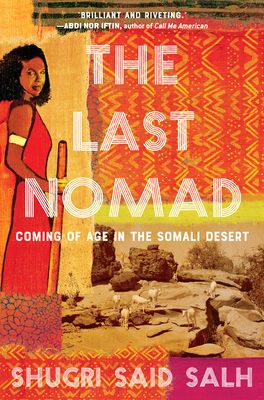Published by Algonquin Books Genres: Memoir
Format: ARC, eBook

BLOG TOUR– July 30, 2021
“I am the last nomad. My ancestors traveled the East African desert in search of grazing land for their livestock, and the most precious resource of all—water. When they exhausted the land and the clouds disappeared from the horizon, their accumulated ancestral knowledge told them where to move next to find greener pastures. They loaded their huts and belongings onto their most obedient camels and herded their livestock to a new home.”
Shugri Said Salh’s memoir details the time from when she was six years old and her mother sent her to live with her Ayeeyo (Grandmother), a nomad living in the dessert. She left behind live in the city, her siblings, her mother, her father and his many wives. Shugri Said Salih wrote “This is the legacy of my ancestors that I want to leave behind me for my children – and my readers.”
By leaving them behind she became the last nomad of her family. The dessert was many things for her – a place to play, a place of hunger, a place of drought, a place of extreme beauty, a place of freedom, a place full of predators, a place of community and a place which held the history of her ancestors. History is a very important thing to those living in Somali. Children can recite the names of their forefathers all the way back to the original four clans.
“When an elder dies, a library is burned.” – An African Proverb.
It is no wonder that the author wanted to tell her history. She begins her chapters with a Somali proverb. She also shares nomadic traditions including a procedure called gudniin -female circumcision. It is a normal part of Somali culture and that young girls look forward to this as they want to be seen as “clean” and not “dirty.”
Shugri Said Salh does move back to the city to be with her family leaving her beloved Ayeeyo behind. She shares of her mother’s death, her pain of not having a photograph of her, of being forced to flee when there is a civil war. She had to flee to Kenya, Canada and finally to the United States. She faced hardships, was homeless, was introduced new lands with modern devices which were foreign to her.
While reading this memoir, I couldn’t help but admire and be impressed by her resiliency. She was brave in ways many of us never have to be. While reading this memoir, I couldn’t help but think could I have lived through this? How did she survive? From the moment she was born, she was taught and conditioned for a nomadic life. Her Ayeeyo and the dessert were her teachers. She bravely faced her female circumcision, she fought back when under attack, and she endured and preserved. She is a survivor.
This memoir not only paints a picture of the author’s life but gives readers a glimpse into another culture. Readers will learn about Somali tradition, customs and survival. I felt for her, I cheered for her, and I enjoyed her story. I admired her strength and courage. This is a moving, well written and captivating memoir.
I was moved by her words about her Ayeeyo (grandmother) “She commanded the dessert with authority, and I watched her every move with deep admiration. My Ayeeyo was my hero, who left me with the belief that I am enough.”
Powerful, moving, informative and gripping!
Thank you to Algonquin Books and NetGalley who provided me with a copy of this book in exchange for an honest review. All the thoughts and opinions are my own.







